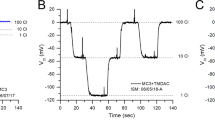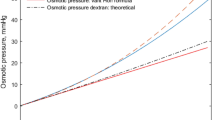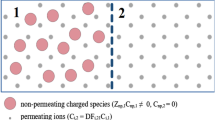Abstract
THE membrane considered is one of special type, with cation and anion pores, permeable to potassium but not to larger sodium ions, and permeable at the same time to small anions of the type of chloride, bicarbonate, phosphate, etc., but not to larger anions such as hexose esters, phosphocreatine, etc. The concentrations inside (or within the cell) and outside the membrane are represented as follows: B/V and b, impermeable cations; k1 and k, potassium; d1and d, permeable anions; A/V, impermeable non-colloidal anions; C/V, colloidal anions inside; x, external impermeable non-electrolyte such as glucose.
This is a preview of subscription content, access via your institution
Access options
Subscribe to this journal
Receive 51 print issues and online access
$199.00 per year
only $3.90 per issue
Buy this article
- Purchase on Springer Link
- Instant access to full article PDF
Prices may be subject to local taxes which are calculated during checkout
Similar content being viewed by others
Author information
Authors and Affiliations
Rights and permissions
About this article
Cite this article
CONWAY, E., BOYLE, P. A Mechanism for the Concentrating of Potassium by Cells, with Experimental Verification for Muscle. Nature 144, 709–710 (1939). https://doi.org/10.1038/144709b0
Issue Date:
DOI: https://doi.org/10.1038/144709b0
This article is cited by
-
A century of exercise physiology: key concepts in muscle cell volume regulation
European Journal of Applied Physiology (2022)
-
Zur Kolloidchemie des Protoplasmas und zum Problem der Permeabilität
Kolloid-Zeitschrift (1960)
-
Biological interlinkage of acid-alkali formation with ion transport and synthetic reduction
The Irish Journal of Medical Science (1949)
-
IONIC PERMEABILITY OF SKELETAL MUSCLE FIBRES
Nature (1946)
Comments
By submitting a comment you agree to abide by our Terms and Community Guidelines. If you find something abusive or that does not comply with our terms or guidelines please flag it as inappropriate.



